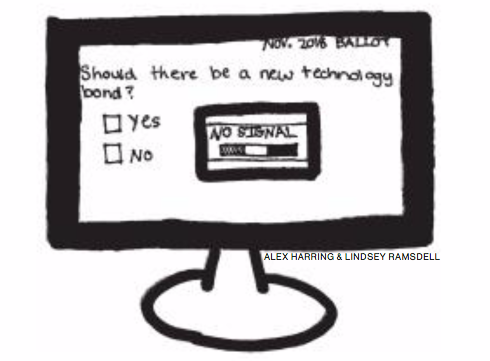Our Editorial: Refreshing the tech bond

December 14, 2016
All elections usher in new ideas and opportunities for growth. As we welcome the new School Board members and look towards the future, we must reflect and focus on the changes that could be made to keep our school system excellent. In order to do so, the Editorial Board would like to propose the idea of a new technology bond for the district.
In 2014, the proposed technology bond was shot down, and with good reason. The bond was great in theory, especially with the possibility of online standardized tests in the next few years. But, it lacked a solid direction and was considered fiscally irresponsible by some. It makes sense that about 70 percent of voters opposed the millage.
Having learned from past mistakes, the Editorial Board supports a new technology bond. The former proposal included items that were unnecessary (like the purchase of armored doors) and hiked up prices, so having more time to revise it would have been beneficial for trustees and voters alike. However, after it didn’t pass, it was pushed aside because of its high disapproval rating.
We hope that the new Board of Education will revisit the idea of a bond, even though the last one was unsuccessful. It has been two years since the last bond was voted on, and students are ready for a new one.
The Editorial Board would like to see the new School Board draft a fair, purposeful bond: one that keeps us competitive with other districts but doesn’t involve undesired additions.
Compared to like school systems, our technology is sorely lacking. Many districts are moving past Smart Boards and desktop computers and towards portable devices and strong internet connections in every building (with a private connection for students and a public one for visitors). Grosse Pointe has class sets of Chromebooks, the renowned Innovation Lab and a district-wide private WiFi service that is often slow and difficult for students to use. We are moving in the right direction, but we aren’t there yet. With a new bond, our schools can stay current.
That isn’t to say that all schools in our district are totally depleted of 21st century equipment. That would be absurd.
Many schools have laptop and iPad carts, but those are usually funded through donations and all-school fundraisers. While those funding efforts are helpful, they aren’t necessarily fair. If one student has a cart of devices at their disposal, but a student at different school doesn’t, that’s an unequal educational opportunity. A district-wide technology bond allows for equal access for all students. This isn’t the fault of any of the School Board’s actions, but it’s evident nonetheless, and should be addressed.
Most schools in our system have adapted to utilizing the technology we have in classrooms, whether it’s computers or student-provided devices. But, when we rely on a bring-your-own-device policy, problems can arise. Students who don’t have the same devices as their peers may feel left out or embarrassed, and don’t have the same opportunities for participation.
We would like to see a plan for an updated infrastructure, which would most likely fall within the parameters of the bond, just as it did in 2014. In parts of district buildings, and specifically in areas of North, the WiFi is slow and sometimes inaccessible. Having no signal for the devices students are relying on makes them useless. Also, desktop computers are slow and often freeze. If a computer lags or stops loading, all of the progress a student made on that computer is at risk of disappearing.
If the new School Board looks at the old bond and learns from its flaws, we believe they can come up with a proposal that includes necessary upgrades, but doesn’t over-do it to the point where it is deemed un-passable.
What does that mean exactly? Recognize that the notion of every student having a take-home device is impractical and focus on having sets of laptops or portable electronics for every computer-less room that relies on online programs. As for the rooms that do have computers, make sure they have updated software and run at a reasonable speed. Also, strive for a solid connection throughout every building so students can efficiently accomplish all they need to in the 49 minutes they are given each class.
Grosse Pointe is known for its boundless educational opportunities, yet the lack of accessible technology puts a damper on students. If this is not aided, the district may potentially lose its competitive edge. A tech bond would help keep us current, preferably enacted within the next few years. Grosse Pointe is ready for a reasonable and considerate bond. Preparing one to be voted on should be a top priority for the new Board of Education.











